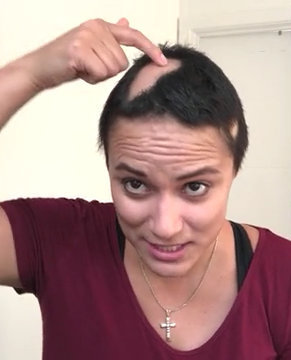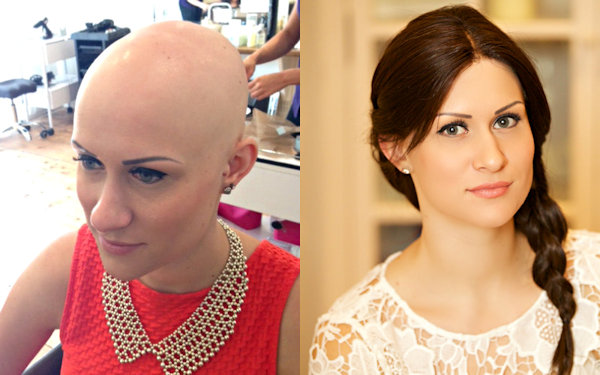The NHS estimates that 8 million women in the UK suffer from some form of hair loss and The Washington Post reports that the figure for genetically inherited fining alone is 30 million women across the United States. Experts believe the true numbers of women dealing with hair loss are much higher however, because of the shame and despair felt by the hidden millions struggling to cope with the condition.
Research has proven that women with severe hair loss can experience deep psychological distress and intense emotional suffering. Hair loss for whatever reason – genetically inherited female-pattern baldness, the most common form of hair loss; age-related fining; alopecia in all its forms; or as a result of chemotherapy, surgery, accidents, scarring or the self-harm of hair-pulling – can result in behavioural changes and social withdrawal that give rise to personal and work-related problems.
Emotional trauma as a hair loss trigger
Emotional shocks are also believed to lead to actual hair loss, although the link is not clinically proven. But if you lose your hair in reaction to a bereavement or other grievous life or financial event this creates a vicious circle of being depressed about the follicles rapidly shedding, and potentially causing further thinning.
TV personality Ranvir Singh first lost her hair in patches at the tender age of eight when her father unexpectedly died. She admits that she suffers from ongoing insecurities because of it and has been frank about how she continues to manage outbreaks of alopecia at the age of 44.
“I feel dreadful,” Ranvir told the Lorraine show earlier this year. “I’ve always had a fringe. I’ve found ways to cover it. I use coloured sprays and things. I’ve got a patch in the middle, I’ve got a patch at the back.”
Ignorant criticism and abuse doesn’t help
Nothing more dramatically illustrates the abuse women can face over hair loss than beautiful actress Jada Pinkett Smith, dignified in a gorgeous green gown and rocking her shaved head, being publicly mocked in front of a global audience of millions over her alopecia, an autoimmune condition she can do nothing to alter, at the 2022 Oscars ceremony.
The taunt and the furious, punchy reaction of her husband Will Smith did have a positive outcome, however, in sparking worldwide debate about how hair loss impacts the female psyche.
Healing is needed, not judgement
Healing is the essence of what women seeking help for hair loss dream of achieving. Hair can, and sometimes does, grow back, but alopecia in particular is very fickle and there is no guarantee your hair won’t fall out again at some stage in reaction to illness or emotional stress.
Regrettably the world judges women – and men, too, but not as fiercely – on the state of their hair. How healthy, thick, glossy, styled, curled, straight, shaved it is, the colour and the texture, and how healthy and glossy and tempting it looks. Or not.
In an ageist society, any sign of baldness reminds us of our frailty and mortality, especially as modern medicine has yet to find a cure. Losing your hair gives rise to feelings of powerlessness as it shows our bodies are beyond our control.
Far more important than mere vanity

When our hair goes wrong for any reason, women are hesitant to trouble their GP about their follicular health, fearing that their concerns may be dismissed and well aware that hair loss is not fatal or dangerous, like cancer or heart trouble. Opinions aired about Jada later – including “why can’t she just wear a wig like everyone else” – proved that many people see female hair loss as a trivial issue and that women should just put up and shut up.
Losing your hair isn’t a death sentence, agreed, but for women the result is definitely life-limiting, in the most literal way. A woman can be scared their scalp may be exposed by a sudden gust of wind, a raindrop, or with a hat or beanie removed without the aid of a mirror. She will dread participation in sports, rainy or windy-day walks, or in activities such as cycling – what if the helmet lifts my hair afterwards to show hidden bald patches?
Perhaps the most damaging aspect is in a woman’s perception of herself as feminine – our concepts of not just beauty but the essence of femaleness itself is closely connected to hair and its flowing, silky appearance. Take that away and you remove an essential component of who you are.
Even professionals don’t always offer support

Women even hesitate to take the problem to a salon for professional advice. There is that icy fear of seeing a horrified reaction, or of hearing nothing can be done about it. Analysis by trained professionals of such a deeply personal problem needs to be empathetically and kindly delivered, and at times, depending on who they are or what they are privately struggling with, that is not available. All these variables make most women extremely cautious about taking anyone into their confidence.
As for getting romantic and your other half wanting to run their fingers through your hair – well, perish the thought.
It is actually quite astonishing that something that can affect so many women at some stage of our lives is still considered so shameful and embarrassing.
However, while we may not be able to reverse hair loss with medicines, nutrition or therapies – yet – there is hope.
Solutions – and a sympathetic ear
Modern medical hairdressing solutions such as the extensive suite of treatments offered by the Lucinda Ellery Consultancy, each individually and carefully tailored to the person in the salon chair, are a lifeline for women dealing with all forms of hair loss challenges.
Every single woman who visits any one of the Consultancy salons found across the UK and the USA will receive warm and supportive care. You will receive expert advice on a personalised hair system that can be cut and coloured in any way to suit you and your lifestyle. You will be shown how to look after and maintain and manage your beautiful new hair. Ongoing aftercare support is also available to all who desire it.
Science has some catching up to do in the field of hair loss but, with the help of Lucinda Ellery, you can feel and look good again with the appearance of a naturally healthy full head of hair.
Your beautiful new hair will lift you back up mentally and physically. The true, unquantifiable benefit of being thus restored in your own eyes, however – and in those of the people who matter – is the return to being the best version of you that you really are.
– – – – –
If you’d like to speak to us about hair loss issues then either call us on 0208 741 8224 or use one of our Contact forms on the main website for whichever studio is closest to you.
London – Manchester – Edinburgh – Midlands (Solihull) – Bristol – Southampton

Hello,
I have Alopicia Areata. Until I read this article, I thought I was content with my hair. However, having now read this, and having dealt with this mentally devastating issue for years ‘with medical care’; I am very interested in what you can offer.
Hello Cheryl, thanks for getting in touch.
We’d be happy to discuss your situation and explore the best options for you. I can ask one of our consultants to email you directly and/or we can arrange a phone, video, or face-to-face consultation – whichever your prefer. (Initial consultations are free and usually last around 30 minutes.)